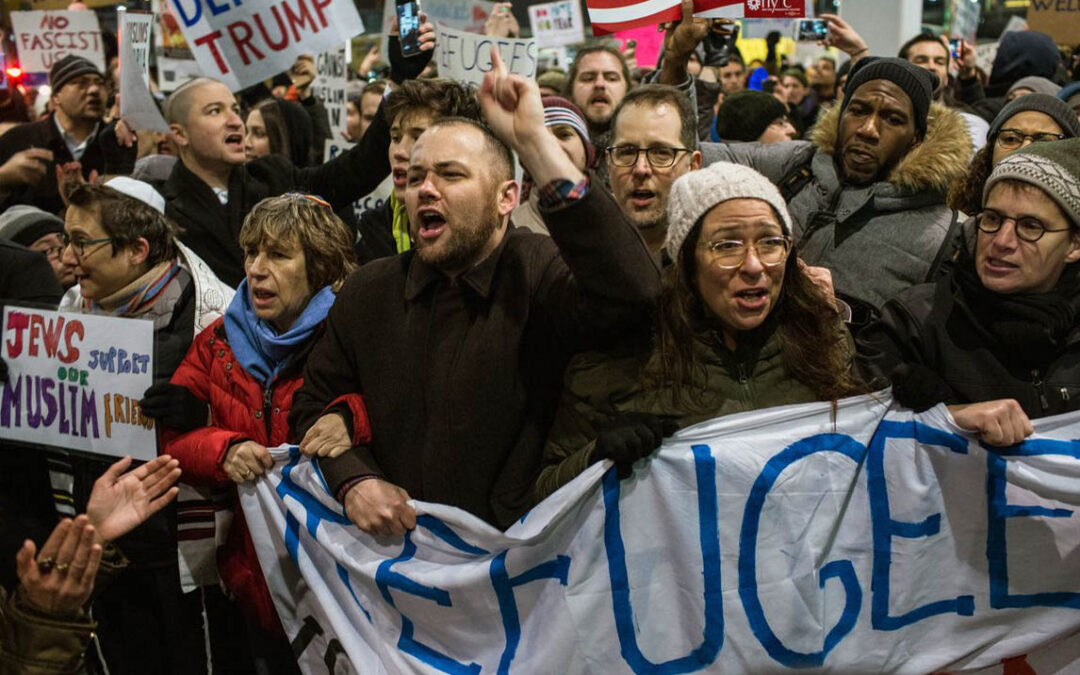
Mar 20, 2017
An opinion piece by Reed Brody, a New York-based human rights lawyer and ICJ Commissioner.
After two months of Trump’s presidency, the battle lines are drawn.
On one side, a would-be dictator with an utter disregard for the foundations of a constitutional democracy: checks and balances, the independence of the judiciary (“so-called” judges), freedom of the press (“the enemy of the people”), the rule of law and the protection of minorities.
Despite the lack of a popular mandate, which he preposterously blamed on millions of illegal voters, Donald Trump is determined to radically transform America, and its relation with the world.
His demonization of Muslims and undocumented foreigners, like the border wall with Mexico, are cruel tactics to stoke fear for political gain and part of a long-term strategy to remake America by changing its demographics.
On the other side, an unprecedented citizen mobilization. The nationwide Women’s Marches the day after Trump’s inauguration were by far the largest demonstrations in US history.
When Trump’s first “Muslim ban” was announced only days later, people spontaneously flooded the airports around the country.
Two months later, this “Resistance” has not slowed – “this is a marathon not a sprint” is the warning one hears at almost every meeting and rally in which we participate.
All around the country, citizens fearful for the future have packed elected officials’ town hall meetings and flooding Congress with petitions, postcards, and phone calls.
Over 500,000 people have downloaded the “Indivisible Guide for Resisting the Trump Agenda”. Over 30,000 people take part in regular nationwide “”Ready to Resist” calls on upcoming strategies.
The premier legal organization challenging Trump’s actions in the courts, the American Civil Liberties Union, raised $24 million in the days following the first Muslim ban.
At my Brooklyn neighborhood synagogue, over 3,000 people organize local activities through 33 working groups including “standing with our immigrant neighbors” and “opposing Trump’s conflicts of interest and corruption.”
What can we expect next?
We live, more than at any time since the US Civil War, in a nation divided into “two Americas.” Liberals and ethnic minorities dominate the cities and the coasts, conservatives the vast rural areas in between.
We watch our TV channels, they watch theirs. We have our newspapers (virtually all of them), they have inflammatory “talk radio.” We have our elected officials, they have theirs, in districts dominated by one party or the other.
The urban concentration of progressives means that the electoral system at all levels favors rural white conservatives, which is why Trump won a large electoral college victory despite losing the popular vote by over three million, and also why the House and Senate are Republican despite an equally large Democratic majority.
But it also means that Democrats are the overwhelming majority in the places that matter most to the economy and the culture – cities like New York City (79% Clinton), Washington DC (93%), Los Angeles (72%), and so on.
Establishment Republicans who were once horrified by Trump have made a Faustian bargain to ignore the clear danger he poses as long as he helps enact their conservative agenda of tax cuts for the rich, elimination of business and environmental regulations, repeal of “Obamacare,” and the transformation of the federal judiciary.
Trump’s proposed budget deeply slashes social programs for the poor, as well as funding for the environment and arts, while super-sizing the military. Paul Ryan, the Speaker of the House who kept his distance from candidate Trump, said they were working together on the “most productive Congress and presidency in our lifetime.”
The question for moderate Republicans (a dying breed) is whether there will ever come a “line in the sand” which they will not let Trump cross.
It is also a question for America’s allies who can challenge Trump on human rights, as has Angela Merkel, Justin Trudeau and most recently Irish PM Enda Kenny.
Because if Trump gets his way, we will see increasingly authoritarian measures in the name of “security.”
Already, large-scale deportations of undocumented persons are underway, ripping apart families and communities.
Who knows how the Administration will take advantage of the next terrorist attack and the one after (Trump said he “didn’t know” if he would have supported the internment of 110,000 Japanese-Americans and Japanese after the attack on Pearl Harbor). With Trump’s reckless approach to foreign policy, we could very well see international calamity.
But it is increasingly possible that Trump will not get his way. The mass resistance, coupled with the White House’s breathtaking incompetence, has stiffened many spines.
The courts have suspended enforcement of both the first and second Muslim Bans. The mainstream press has indeed, in the words of Trump strategist Stephen Bannon, taken on the role of the “opposition party.”
Everything has become political today. Sports. Oscars. Shopping. Companies in high-tech and globalized industries opposed the travel ban. Consumer companies support Trump (or sell his family’s products) at their peril – when Uber appeared to seek profit a New York City taxi strike to protest the Muslim Ban, 200,000 customers deleted their Uber accounts.
The leaks from US intelligence agencies about the Trump campaign’s contacts with Putin’s Russia also threaten Trump’s future, not only for what they may reveal about his collusion with Russia, but because they suggest that the “deep state,” (a term familiar to Turks and Egyptians but never used in America until now) is worried about where Trump might take the country and the world.
Another scenario then is that at some point the chaos and disruption will become so costly that the establishment will risk enraging Trump’s already angry base and seek to replace him with the more traditional conservative Mike Pence.
Even if they don’t lead to Trump’s impeachment or resignation, though, all of these actions make it harder for him to implement his radical agenda and more likely that America (and the world) will survive Trump with some semblance of our liberties and democracy intact.
If that happens, perhaps we will indeed “Make America Great Again,” just not in the way Donald Trump intended.
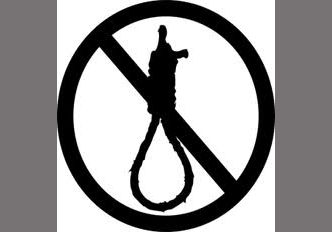
Feb 14, 2017
An opinion piece by Emerlynne Gil, ICJ Senior International Legal Adviser in Bangkok.
In the next few days, the House of Representatives may vote in plenary on the bill proposing to bring back the death penalty in the Philippines.
Curiously, when this bill was being heard at the Sub-Committee on Judicial Reforms in Congress, the Department of Justice (DOJ) and the Philippine National Police (PNP) presented scant evidence in support of the proposed measure.
It was as if they were confident that the bill would get passed anyway, regardless of the facts.
Even more curious is that the committee report on the hearings on this bill did not reflect the arguments presented by anti-death penalty groups.
In fact, the committee report did not discuss at all what transpired during the hearings.
I doubt that members of Congress really ruminated on both sides of the debate on this issue.
I think congressmen will vote to pass this bill not because they genuinely believe death penalty will deter crime, but it will be their sycophantic gesture to please President Rodrigo Duterte, who they think will grant them political favors if they do what he wants.
There will also be others who will vote for this bill because of pressure from the party leadership.
Nobody will openly admit this. They will point to public opinion. They will claim that Filipinos are clamoring for the death penalty. Hence, their support for the bill.
Looking at social media comments and online opinion polls, one could indeed get the impression that many Filipinos want the death penalty back. However, social media comments and online polls do not use valid scientific methodology for random selection of participants. Furthermore, even when appropriate methodologies are used, results can be easily affected by how the questions are framed.
In 2012, the Bar Council of Malaysia and the Death Penalty Project, a UK-based non-governmental organization, conducted a study on the public’s views on mandatory death penalty in Malaysia.
At the outset of the survey, majority of the respondents said that they were in favor of the death penalty – whether it was discretionary or mandatory.
Ninety-one percent (91%) said they were in favor of death penalty for murder, 74 percent to 80 percent were in favor of the death penalty for drug trafficking (depending on the drug concerned), while 83 percent were in favor of death penalty for the discharge of firearms during the commission of certain crimes.
However, when asked to ‘judge’ specific cases, there was a significant difference between support of the respondents at the beginning and their support after they have been faced with ‘real’ cases.
When respondents were asked whether they would still support the death penalty after being shown cases where innocent persons were executed, the numbers of those in favor of death penalty for murder drastically fell to 33 percent, for drug trafficking to 26 percent, and for the discharge of firearms to 23 percent.
Even leaving aside the unscientific nature of comment forums and online polls, there is no evidence that the members of the public responding to questions about the death penalty have had their initial beliefs tested in the ways set out above.
We simply do not know with any certainty what the well-informed public opinion on this question would be.
Political leadership, not public opinion, matters most in preventing the death penalty from being brought back.
President Duterte openly said he wants to bring death penalty back, but he, alone, is not the Philippines’ political leadership.
It is imperative for Philippine lawmakers to act as independent leaders now and show the public how death penalty is deeply incompatible with human dignity. They have to see that the imposition of the death penalty is a violation of the right to life and the absolute prohibition of torture and other cruel, inhuman or degrading treatment or punishment.
The ICJ has previously said that the imposition of the death penalty is a violation of the right to life and the absolute prohibition of torture and other cruel, inhuman or degrading treatment or punishment.
As a party to the Second Optional Protocol to the International Covenant on Civil and Political Rights (ICCPR), the Philippines has a legal obligation to ensure that no person within its jurisdiction will face execution.
If the Philippines adopts a law bringing back the death penalty, it will violate its commitments under international law and would stand in opposition to the international trend towards the abolition of the death penalty.
The Philippine Constitution was designed so that the country’s democracy will not be held hostage by one man.
This bill will be one of the very many tests in the next few years on how well established and how strong Philippine democracy has become.
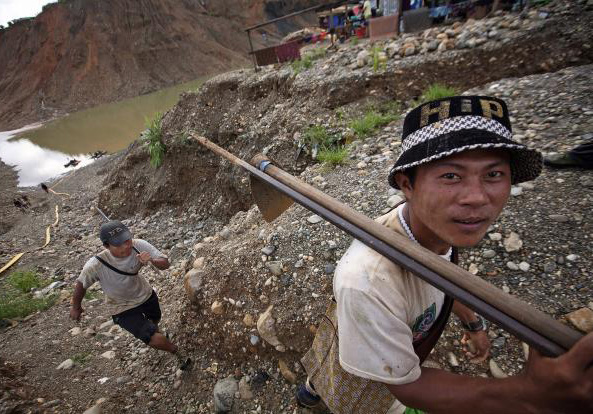
Nov 3, 2016
An opinion piece by Vani Sathisan, ICJ International Legal Adviser in Myanmar.
Sagaing Region ministers have been meeting opponents of the Letpadaung copper mine to discuss a list of grievances, including lingering questions about the death of a protester.
“Here is a real bullet, beside a shotgun shell with rubber pellets inside, that were used on the day Daw Khin Win was killed. I kept them as evidence. Why were real bullets used to disperse a crowd that was peacefully protesting?”
A relative of Khin Win put the question to representatives of the International Commission of Jurists during a recent visit to Monywa to monitor the human rights impact of the nearby Letpadaung copper mine.
The bullet displayed by the villager was used in the fatal shooting on December 22, 2014, of Khin Win, a landowner, during a protest against the expansion of the mine.
Two other villagers were hurt in the same protest over the seizure of land in 35 nearby villages.
There remains a lack of transparency about whether there has been any credible investigation of villagers’ claims that workers from Wanbao joined forces with police that day to violently disperse the protestors.
Wanbao – a subsidiary of China’s state-owned weapons maker Norinco, which runs the mine in a joint venture with the Union of Myanmar Economic Holdings Limited – restarted production in May.
In April, Wanbao released a slick corporate social accountability video called “A New Dawn” to show it had a “social licence” to operate.
However, the ICJ’s discussions with affected communities, including meetings at the Sagaing regional hluttaw and the General Administration Department of the Ministry of Home Affairs, found different sentiments in villages near the project.
Grievances in the communities included land grabs, loss of livelihoods and environmental damage.
Lawyers in the region have noted a problem of “compensation culture”, in which villagers sometimes exhaust the “compensation” they have accepted for the loss of farmland and then allegedly submit unjustified or frivolous claims for compensation from companies.
Whether or not this is common practice, it is clear that Wanbao has failed to engage in genuine community consultation about compensation that is equitable and transparent.
Last year, Amnesty International reported that Wanbao “directly engaged in forced evictions… by constructing infrastructure on their land despite being aware that the people had not agreed to move or been paid adequate compensation.”
The ICJ representatives saw destroyed arable land and crops as well as polluted waterways near the mine site, which is close to the Chindwin River.
The Letpadaung operation has been dogged with opposition since its inception in 2011 under Myanmar’s former military government.
In November 2012, police allegedly used white phosphorous smoke grenades to disperse hundreds of peaceful protesters camped at the mine site.
Dozens of people, including many monks, suffered extensive chemical burns.
The use of white phosphorous, a highly corrosive chemical, against civilians even in armed conflicts is prohibited under the 1980 Geneva Conventions.
The government responded to outrage over the incident by appointing Daw Aung San Suu Kyi, who was opposition leader at the time, to chair an investigation commission while work was suspended at the mine.
In its report published on March 12, 2013, the commission acknowledged that Wanbao had not conducted an environmental and social impact assessment, but said that cancelling the project would affect job creation and ties with China, one of Myanmar’s biggest trade partners and its top foreign investor.
Wanbao publicly stated that it welcomed the commission’s report.
In an effort to address community outrage, Wanbao has taken some steps to implement the terms of its revised agreement with the former Myanmar government.
The Myanmar Centre for Responsible Business stated that Wanbao’s ESIA disclosed in January 2014 and completed by Australian consulting firm Knight Piesold, was undertaken with “benchmarking against international standards, including those of the International Finance Corporation”.
However, public consultation on Wanbao’s ESIA report has been limited.
When the ICJ wrote to Wanbao seeking more information on how it could better protect the human rights of those affected by its project, it responded that “Myanmar Wanbao adheres to international good practice and international standard in environmental conservation and CSR activities and are making every effort to reduce the environmental impact of the project and minimize the footprint of our activity throughout the different phases of the project.”
The response made no reference to human rights.
The Myanmar Police Act 1945 empowers police officers to regulate public assemblies and processions, but nowhere in the legislation is there a justification for unlawful disproportionate use of force.
International law and standards govern the use of force. The United Nations Basic Principles on the Use of Force and Firearms by Law Enforcement Officials, while acknowledging that in certain limited circumstances police can and will need to use force to maintain law and order, states that this must be done in proportionately and in compliance with international human rights law and must never be seen as a licence to kill or granting immunity to police officials.
The judiciary has shown itself unable or unwilling of providing for access to justice.
The legal system has instead been used to suppress freedom of expression and arbitrarily try and imprison those who peacefully protest against human rights abuses by businesses.
The ICJ had monitored the trials of activists who peacefully demonstrated outside the Chinese Embassy in Yangon in 2014, calling Myanmar authorities to carry out an urgent and impartial investigation into the death of Khin Win.
In early September, Sagaing Region ministers met communities opposed to the mine project in a first effort by government to address their longstanding grievances.
The Union government must increase protection for human rights and the environment by ensuring that corporations such as Wanbao embed human rights in their business practices and are held accountable for failing to do so.
Until then, there continues to be impunity for those responsible for Khin Win’s death.
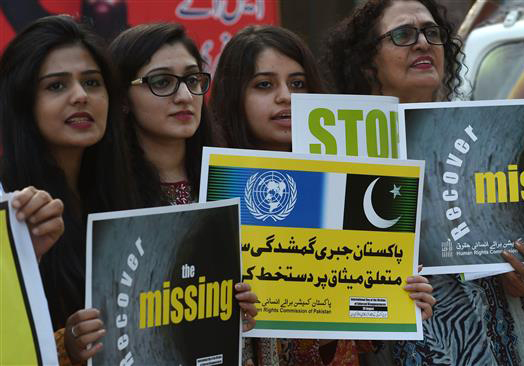
Sep 26, 2016
An opinion piece by Reema Omer, ICJ Legal Adviser in Pakistan.
“There is a climate of impunity in Pakistan with regard to enforced disappearances, and the authorities are not sufficiently dedicated to investigate cases of enforced disappearance and hold the perpetrators accountable.”
The UN Working Group on Enforced and Involuntary Disappearances (WGEID) made this scathing assessment of Pakistan’s dismal response to the widespread practice of enforced disappearances in the country in a report presented to the UN Human Rights Council last week.
The report is a follow-up of the recommendations made by the WGEID pursuant to a country visit to Pakistan in 2012.
In the report, the Working Group “regrets that most of the recommendations contained in its country visit report have not been implemented” and also points out that the Government has failed to communicate even a single case “where perpetrators of enforced disappearances have been held accountable.”
The WGEID’s critical assessment of Pakistan’s record in confronting serious human rights violations at the UN Human Rights Council should push the Government to reconsider its perfunctory engagement with UN human rights mechanisms and work towards implementing its recommendations on ending the now nationwide practice of enforced disappearances.
The WGEID reiterated its previous calls that the crime of enforced disappearance be expressly included in Pakistan’s criminal code.
Despite hundreds, if not thousands, of people “missing” in Pakistan following the apparent abduction by or with the complicity of the state, enforced disappearances are still not specifically criminalized.
This is particularly deplorable as Pakistan accepted a recommendation made during its 2012 Universal Periodic Review to make enforced disappearances a distinct crime.
As a result, on the rare occasion where the police register criminal complaints in such cases, “disappearances” are reported as “missing persons” cases or as cases of “abduction” or “kidnapping”.
These categories are inadequate classifications of enforced disappearance cases as they do not recognize the seriousness or complexity of the crime; do not provide for commensurate penalties; and do not address the need to remedy the suffering and grief of families of those “disappeared”, who are not considered “victims” according to the law.
In a conference on enforced disappearances last month, the ICJ and Human Rights Commission of Pakistan (HRCP) also highlighted the Government’s failure to specifically criminalize enforced disappearance as one of the biggest hurdles towards bringing perpetrators to justice.
Furthermore, the WGEID reiterated that “clear rules and dedicated institutions should be created to ensure the oversight and accountability of law enforcement and intelligence agencies” in light of the security agencies’ failure to comply with orders of the courts and the Commission of Inquiry on Enforced Disappearances.
Since the 21st Amendment to the Constitution empowering military courts to try certain terrorism-related cases, Pakistan has moved further from ensuring “oversight and accountability” of security agencies, particularly where alleged excesses and human right violations are in the name of “fighting terrorism”.
Pursuant to the 21st Amendment and amendments to the Army Act, 1952, all personnel associated with military courts –including members of the court, prosecutors, and “any person concerned with court proceedings” – have complete immunity from prosecution for actions taken in “good faith”.
This immunity is retrospective, which means that even if people were arrested and detained before the 21st Amendment was passed, they are considered to be arrested or detained under the authority of the amended law and therefore may benefit from its immunity provisions.
In practice, as feared by human rights activists and criminal justice proponents, this has led to further entrenching impunity for the crime of enforced disappearance.
The WGEID’s report comes just weeks after the Supreme Court dismissed all 16 petitions made by families of people convicted and sentenced to death by military tribunals.
In some cases, the families had alleged people convicted by military courts had been subjected to enforced disappearance by military authorities as far back as 2010 and had been kept in secret detention for many years before their military trials.
In the past, the Supreme Court has acknowledged the unlawfulness of keeping people in secret detention, even calling this practice a “crime against humanity” and urging strict action against those responsible.
In this case, however, the Court refused to even consider the question of the alleged “disappearances”.
Interpreting its jurisdiction to review trials by military courts very narrowly, it held that the circumstances in which people were arrested, even if they were forcibly disappeared and kept in secret detention for years, was not relevant.
What this means is that a conviction by military courts “legitimizes” the act of enforced disappearance, and people abducted by law enforcement agencies years before military courts were even authorized to try cases of civilian terrorism suspects are left with no legal recourse to challenge their “disappearance”.
As the WGEID highlighted in its report, there is no question that Pakistan faces serious security challenges.
However, experience from around the world shows that disregard for human rights fuels cycles of terrorism and counterterrorism, and that respect for human rights must necessarily constitute a part of the solution in situations of conflict and instability.
This means that all suspects, including people suspected of committing terrorism-related crimes, must be given a chance to defend themselves in trials that meets basic standards of fairness.
The cruel practice of forcibly disappearing people and putting them outside the protection of the law must end.
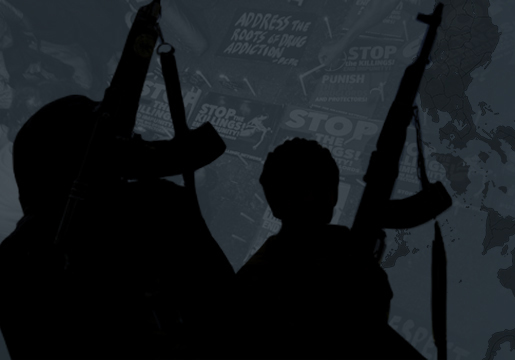
Sep 22, 2016
An opinion piece by Emerlynne Gil, ICJ Senior International Legal Adviser, Asia & Pacific Programme, based in Bangkok, Thailand.
One of the points that emerged clearly from the Philippines’ Senate hearing on extrajudicial killings held on 15 September was that the Philippines must get rid of its militias immediately.
These dangerous, Government-sponsored armed groups must be abolished and their existing members demobilized.
During the hearing, the Committee on Justice & Human Rights called Edgar Matobato as a witness, who claimed to be a former member of the Civilian Armed Forces Geographical Units (CAFGU) when he was selected to join Davao Death Squad (DDS) and told to kill — extrajudicially execute — suspected criminals in Davao City when President Rodrigo Duterte was the city’s mayor.
The CAFGU is an irregular auxiliary group for the Armed Forces of the Philippines (AFP), one of the militias operating in the country today. It was created in 1987 through Executive Order 264 issued by President Corazon Aquino.
It was justified as a ‘vital tool’ in the Government’s counter-insurgency measures.
Another militia group in the Philippines is the Civilian Volunteer Organization (CVO), which is meant to assist barangay officials in maintaining peace and order in the community.
While the CAFGU is controlled by the AFP, the Philippine National Police (PNP) controls the CVO.
Matobato’s profile is typical of that of the many individuals who comprise these militias.
Upon Senator Sonny Angara’s questioning, Matobato revealed that he had not completed his elementary education and had been working as a subsistence farmer when he was recruited to join CAFGU.
He disclosed that he did not have any knowledge or training about the legal processes involved in apprehending criminals and did not have any understanding of how the justice system works.
Joining the militias is an attractive option for people like Matobato who have a difficult time getting a job to feed their families. Members of CAFGU receive a subsistence allowance of around P4,600 per month (approximately US$96), which is a reasonably attractive salary for people in situations of hardship.
They also receive other benefits, such as scholarships for their dependents and health insurance.
Joining the militias is also very easy. For instance, to join the CAFGU, one only needs the approval of the local military head.
In some areas, one may also just present a recommendation from a local chief executive — whether the barangay captain or the mayor.
Immediately after the Senate hearing last Thursday, the spokesperson for the armed forces denied that Matobato was ever a member of the CAFGU.
He said that they could not find his name in their database.
Because recruitment policies are not standardized and are often very informal, it would be easy for the military to repudiate claims of membership with the CAFGU.
The CAFGU was formed as “force multipliers” for the AFP, to help the army in counter-insurgency activities.
One of the main tasks of CAFGU members is to assist the military in fighting the New People’s Army (NPA).
They participate in offensive operations against the NPA and act as local guides during military patrols.
In non-conflict areas, however, CAFGU members are used to act as guards for military installations or sometimes even private businesses.
Militia recruits do not receive the rigorous training given to personnel of the armed forces or the police.
At most, they are given very basic weapons training, enough to enable them to handle the firearms they are given from the Government’s arsenal.
Militia recruits certainly do not receive training on basic military discipline or law enforcement practices, much less on general human rights principles.
The lax recruitment practices and the lack of training, especially on basic policing principles and applicable human rights standards, have resulted in numerous human rights abuses committed by militias, including extrajudicial killings and enforced disappearances.
For decades, human rights groups have raised serious concerns about these abuses.
In 2015, CAFGU members, along with several military personnel, were alleged to have been involved in the extrajudicial killing of three human rights defenders from the Alternative Learning Center for Agricultural and Livelihood Development (ALCADEV) in Surigao del Sur.
Bills were presented in the past seeking to repeal Executive Order 264 and demobilize these militias, but these were never passed.
During the second cycle of the United Nations’ Universal Periodic Review (UPR) in 2014, the Philippines Government committed to take measures to exert more control over these militias.
The Government also committed to holding these militias accountable pursuant to the Philippines’ obligations under international human rights law.
The 2015 General Appropriations Act provides that no new CAFGUs shall be recruited in anticipation of the planned demobilization of the group “as a result of the implementation of the Revised AFP [Armed Forces] Modernization Program”.
That is indeed an important step.
However, to accelerate the demobilization of these groups and solidify the commitments made by the Philippines during the UPR, lawmakers should pass a law repealing Executive Order 264 and demobilizing all militias in the country.
Demobilizing the militias should not only mean formally disbanding the groups and requiring their members to turn in their firearms.
The law should also provide for the practical implementation by the Philippines of its international human rights obligation to investigate all allegations of human rights abuses made against members of these groups so that the perpetrators of such abuses are brought to justice.
Reparations for victims and their families must also be provided under the law.
Enacting this law would be one positive outcome of these hearings.
The Senate must indeed continue to address the crisis of extrajudicial killings in the Philippines under President Duterte so the killings will stop and the killers brought to justice.
But if one result of the hearings would be to abolish militias and properly demobilize the current members of these dangerous institutions, it would be an important step towards ending the human rights violations and abuses committed by militias and Government-sponsored death squads in the Philippines.









